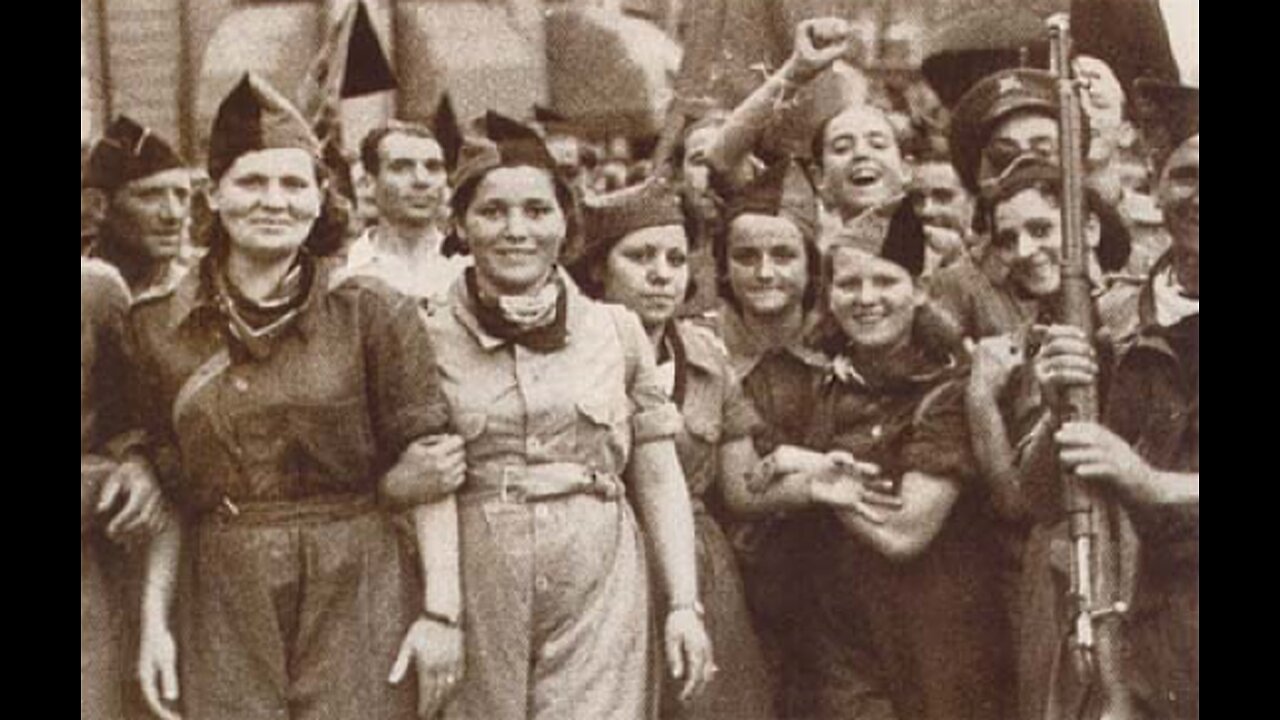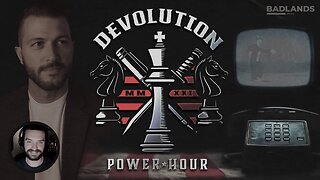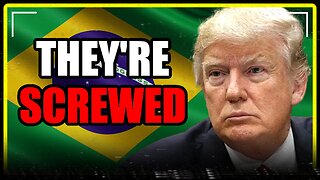Premium Only Content

Between Ideals and Reality: A Critique of Socialism and its Future
The dark side of history: https://thememoryhole.substack.com/
Svetozar "Sveta" Stojanović (Serbian Cyrillic: Светозар Стојановић) (18 October 1931 – 7 May 2010) was a Serbian philosopher and political theorist.
Biography
Stojanović was an intellectual in the European tradition, an academic who contributed to philosophical theory and engaged in practical politics. He bridged the divide between the more grand and speculative Continental philosophy and analytic Anglo-American ethical theory. His doctoral dissertation on Contemporary Meta-ethics was grounded on his study of ordinary language analysis at the University of Oxford and later he met weekly at the University of Michigan to discuss ethical issues with William Frankena, Richard Brandt and Charles Stevenson. But the focus of his important contributions to philosophy was always critical Marxism, Marxism creatively interpreted as a critique of social institutions destructive of humanistic values. He is best known for his rejection of the dictatorship of the proletariat and advocacy of a democratic socialism.
Svetozar Stojanović was born in 1931 in Kragujevac, Kingdom of Yugoslavia (present day Serbia) and received a PhD in philosophy from the University of Belgrade in 1962. Together with seven other professors and teachers, called The Praxis Group, he was expelled from the University of Belgrade in January 1975 for dissident activities during Josip Broz Tito's regime in Yugoslavia. He returned to the University in the early nineties as socialist Yugoslavia was falling apart. In 1992 and 1993 he served as a special adviser to former Yugoslav President Dobrica Ćosić.
Stojanović was a longtime critic of Slobodan Milošević, and one of the protagonists in the October 2000 Serbian democratic revolution which culminated in the overthrow of Milošević. He was appointed to the Commission for Truth and Reconciliation by former Yugoslav President Vojislav Koštunica, and later became a member of the Council for Foreign Relations of the Ministry of Foreign Affairs of Serbia.
Stojanovic was a member of the Council for Secular Humanism's International Academy of Humanism, a member of the Paris International Institute of Philosophy (Institut International de Philosophie) and the Academy of Humanistic Studies in Moscow. In 1973 he was one of the signers of the Humanist Manifesto II.[1] He was co-chairman of the International Humanist and Ethical Union, 1985-87.[2] He was a long-time director of the Institute for Philosophy and Social Theory in Belgrade and the member of the governing board of Korčula Summer School. Stojanović was a visiting professor at many prominent universities in the United States, Germany, Great Britain, Austria, and India.
With Djuro Kovacevic, another Serbian political theorist, Stojanović was a co-founder and president of the Serbian-American Center in Belgrade, which developed into the Center for National Strategy, and the Forum for Serbian-American Dialogue and Cooperation.
He was the chief editor of Praxis International from 1987–1990 and, most recently, a member of the editorial council of Philosophy & Social Criticism, based in Boston.
Stojanović authored seven books, four brochures, and 130 journal articles. His works have been translated into fourteen languages, including English, German, French, Russian, Spanish, and Japanese. Books in English include: Between Ideals and Reality: A Critique of Socialism and Its Future, Oxford University Press, 1973; In Search of Democracy in Socialism, Prometheus Books, Buffalo, NY, 1981; From Marxism and Bolshevism to Gorbachev, Prometheus Books, 1988; The Fall of Yugoslavia: Why Communism Failed, Prometheus Books, 1997; and Serbia: The Democratic Revolution, Humanity Books, Buffalo, NY, 2003.
Selected works
Stojanovic S. (1973) Between Ideals and Reality: A Critique of Socialism and its Future. Oxford University Press
Stojanovic S. (1981) In Search of Democracy in Socialism: History and Party Consciousness. Buffalo, NY: Prometheus Books
Stojanovic S. (1988) Perestoika: from Marxism and Bolshevism to Gorbachev. Buffalo, NY: Prometheus Books
Stojanovic S. (1997) The Fall of Yugoslavia: Why Communism Failed. Buffalo, NY: Prometheus Books
Stojanovic S. (2003) Serbia: The Democratic Revolution. Buffalo, NY: Humanity Books
References
"Humanist Manifesto II". American Humanist Association. Retrieved October 18, 2012.
"Humanists International".
External links
A profile in The Transnational Foundation for Peace and Future Research [1]
An article and profile in [The Guardian] [2]
Serbia: The Democratic Revolution reviewed in [Foreign Affairs] [3]
A 1971 article in [The New York Review of Books] [4]
A 2010 Essay/Documentary from RTS - Serbian TV [RTS - Pravo na Budućnost] [5]
Authority control databases Edit this at Wikidata
International
FAST ISNI VIAF
National
France BnF data Germany Israel Belgium United States Czech Republic Netherlands Poland
People
Deutsche Biographie
Other
IdRef
Categories:
20th-century Serbian philosophers Serbian political philosophers Academic staff of the University of Belgrade University of Belgrade Faculty of Philosophy alumni 1931 births 2010 deaths
Real socialism, better known as actually existing socialism[1] was an ideological catchphrase popularized during the Brezhnev era in the Eastern Bloc countries and the Soviet Union.[2]
The term referred to the Soviet-type economic planning implemented by the Eastern Bloc at that particular time.[2] From the 1960s onward, Eastern Bloc countries such as Poland, East Germany, Hungary, Czechoslovakia, and Yugoslavia began to argue that their policies represented what was realistically feasible given their level of productivity.
The concept of real socialism alluded to a highly developed socialist system in the future. The actual party claims of nomenclatory socialism began to acquire not only negative, but also sarcastic meanings. In later years and especially after the dissolution of the Soviet Union, the term began to be remembered as only one thing, i.e. as a reference for Soviet-style socialism.[note 1]
The executive committee of the Comecon in session
Definition
After World War II, the terms "real socialism" or "really existing socialism" gradually became the predominating euphemisms used as self-description of the Eastern Bloc states' political and economical systems and their society models.[3] De jure often referred to as "people's republics", these states were ruled by a communist party, some of which were ruled autocratically and had adapted a form of planned economy and propagated socialism and/or communism as their ideology.[3] The term "real (-ly existing) socialism" was introduced to explain the obvious gap between the propagated ideological framework and the political and economical reality faced by these states' societies.[3][4][5] As US Communist Party activist Irwin Silber put it in 1994,
The term 'actually existing socialism’ is not (despite the quotation marks) a sarcasm; in fact, while obviously containing an implicit irony, the phrase itself was coined by Soviet Marxist-Leninists and was widely used by the Communist Party of the Soviet Union (CPSU) and its supporters in polemics with those who postulated a model of socialism significantly different from the system developed in the Soviet Union. Its point was that various alternatives to the Soviet-derived model existed only in the minds of their advocates, while 'actual socialism' existed in the real world.[6]
The term was also taken up by some dissidents, such as Rudolf Bahro, who used it in a more critical way.[7][8]
The role of the Sino-Soviet split
Another aspect of the term real socialism related to the Sino-Soviet split and other ideological disagreements between the Soviet Union and its satellite states on one side and the People's Republic of China and the followers of a more Maoist brand of communist ideology on the other. The Sino-inspired communist movement, which had grown so rapidly worldwide as a "radical left" alternative to Soviet ideas, had claimed that the Soviet Union was no longer socialist and had betrayed the revolution. To counter this claim of Marxist revisionism, the Soviets called their version "real socialism", implying that other models of socialism were unrealistic.[9]
See also
Actually existing capitalism
Communist state
Marxism–Leninism
Moderately prosperous society
Primary stage of socialism
Soviet-type economic system
State socialism
Transition economy
Notes
See definitions and descriptions of "real socialism" in the following:
Kyu-Young Lee, "System Transformation in Poland since 1989: A view on the transformation of the real-socialist system. Including List of References. Graduate School of International Studies, Sogang University.
Krzysztof Brzechczyn, The Collapse of Real Socialism in Eastern Europe. Adam Mickiewicz University, Department of Philosophy. The Journal of Interdisciplinary Studies in History and Archaeology. Vol. 1, No. 2, pp. 105–133
Tittenbrun, Jacek (1993). The Collapse of 'Real Socialism' in Poland. Paul & Co Pub Consortium. ISBN 1-85756-043-4.
Robert W. Cox, "Real socialism" in historical perspective. Pages 177–183. Retrieved November 3, 2011. See term: "actually existing socialism" in Rudolph Bahro's The Alternative in Eastern Europe, Note 3, p. 190.
References
Citations
Sebestyen, Victor (2010). Revolution 1989: The Fall of the Soviet Empire. Phoenix. ISBN 978-0-7538-2709-3.
"Socjalizm Realny" [Real Socialism]. Encyklopedia Interia (in Polish). Retrieved 22 November 2013.
Hey, Patrizia (2010). Die sowjetische Polenpolitik Anfang der 1980er Jahre und die Verhängung des Kriegsrechts in der Volksrepublik Polen. Tatsächliche sowjetische Bedrohung oder erfolgreicher Bluff? [The Soviet policy towards Poland in the early 1980s and the imposition of martial law in the People's Republic of Poland. Actual Soviet threat or successful bluff?]. Studien zu Konflikt und Kooperation im Osten (in German). Vol. 19. Münster: LIT. p. 31. ISBN 9783643107718.
"A Guide To The Left". New Internationalist. 5 November 1985. Retrieved 21 September 2021.
Lebowitz, Michael A. The Contradictions of "Real Socialism".
Silber, Irwin (1994). Socialism: What went wrong? (PDF). Pluto Press – via Marxists Internet Archive.
Bahro, Rudolf (November–December 1977). "The Alternative in Eastern Europe" (PDF). New Left Review (I/106): 3–37. Retrieved 21 September 2021. "Socialism as it actually exists, irrespective of its many achievements, is characterized by: the persistence of wage-labour, commodity production and money; the rationalization of the traditional division of labour; a cultivation of social inequalities that extends far beyond the range of money incomes; official corporations for the ordering and tutelage of the population; liquidation of the freedoms conquered by the masses in the bourgeois era, instead of the preservation and realization of these freedoms (only consider the all-embracing censorship, and the pronounced formality and factual unreality of so-called socialist democracy). It is also characterized by: a staff of functionaries, a standing army and police, which are all responsible only to those above them; the duplication of the unwieldy state machine into a state and a party apparatus; its isolation within national frontiers."
Frank, Pierre; Rosenzweig, Mark; Vale, Michel (1980). "Was". International Journal of Politics. 10 (2/3). Taylor & Francis, Ltd.: 152–167. ISSN 0012-8783. JSTOR 40470166. Retrieved 21 September 2021.
Sarnov, Benedikt (2002). "Real Socialism". Our Soviet Newspeak: A Short Encyclopedia of Real Socialism (Наш советский новояз. Маленькая энциклопедия реального социализма). Moscow. pp. 472–474. ISBN 5-85646-059-6.
Sources
General
Real socialism from A Dictionary of Sociology, 1998, originally published by Oxford University Press.
vte
Socialism
History - Outline
Schools of
thought
21st century Agrarian Communist Democratic Ethical Feminist Green Guild
Labourism Syndicalism Liberal Market Marxian Nationalist Reformist Revolutionary Scientific Social democracy Utopian
Fourierism Icarianism Owenism Saint-Simonianism
Technocracy
Libertarian
(from below)
Anarchism
Collectivist Communist Free-market
Left-wing laissez-faire Left-wing market Green Individualist Insurrectionary Magonism Mutualism Neozapatismo Platformism Communalism Social Syndicalist Left-libertarianism Libertarian Marxism
Left communism
Council communism Luxemburgism Mao-Spontex Trotskyism
Pabloism Posadism Orthodox Trotskyism Third camp
Authoritarian
(from above)
Barracks
Nechayevism Blanquism Bolshevism
Leninism Marxism–Leninism
Brezhnevism Castroism Ceaușism Guevarism Ho Chi Minh Thought Hoxhaism Husakism Juche Kadarism Khrushchevism Maoism
Dengism Maoism–Third Worldism Marxism–Leninism–Maoism Marxism–Leninism–Maoism–Gonzalo Thought Marxism–Leninism–Maoism–Prachanda Path Xi Jinping Thought Stalinism
Neo-Stalinism Tkachevism State
Lassallism
Religious
Buddhist Christian
anarchism communism Islamic Jewish
Regional variants
African African-Caribbean Arab Bolivarian Chinese
Communist Nationalist European
Eurocommunism Indian Israeli Indonesian Melanesian Mexican Soviet
In one country Real Sri Lankan Third World Yugoslav
Key topics
and issues
Anarchist economics Anti-revisionism Criticism of capitalism Criticism of socialism Critique of political economy Critique of work Class struggle Democracy Dictatorship of the proletariat Egalitarianism Equal liberty Equality of opportunity Equality of outcome History of anarchism History of communism History of socialism Impossibilism "The Internationale" Internationalism State-owned enterprise Land reform Left-wing politics Mixed economy Mode of production Nanosocialism Nationalization Planned economy Post-capitalism Proletarian revolution Reformism Revisionism Socialisation of production Socialist economics Socialist market economy Socialist state State capitalism Trade union Welfare state Workers' council
Concepts
Adhocracy Anarchist economics Basic income Calculation in kind Common ownership Cooperative ownership Decentralized planning Direct democracy Economic democracy Economic planning Equal opportunity Free association of producers Industrial democracy Labor-time calculation Labour voucher Organizational self-management Production for use Public ownership Social dividend Socialist mode of production Technocracy Workplace democracy
People
16th c.
Tommaso Campanella Thomas More
18th c.
Gracchus Babeuf Victor d'Hupay Gabriel Bonnot de Mably Sylvain Maréchal Étienne-Gabriel Morelly
19th c.
Stephen Pearl Andrews Mikhail Bakunin John Goodwyn Barmby Enrico Barone August Bebel Edward Bellamy Eduard Bernstein Louis Blanc Louis Auguste Blanqui Philippe Buchez Georg Büchner Philippe Buonarroti Francisco Largo Caballero Étienne Cabet Edward Carpenter Nikolay Chernyshevsky James Connolly Victor Prosper Considerant Claire Démar Théodore Dézamy W. E. B. Du Bois Prosper Enfantin Friedrich Engels Charles Fourier Emma Goldman William Batchelder Greene Charles Hall Alexander Herzen Thomas Hodgskin Jean Jaurès Mother Jones Karl Kautsky Peter Kropotkin Paul Lafargue Ferdinand Lassalle Pyotr Lavrov Alexandre Ledru-Rollin Pierre Leroux Helen Macfarlane Errico Malatesta Karl Marx Louise Michel Nikolay Mikhaylovsky William Morris Robert Owen Antonie Pannekoek Giovanni Pascoli Constantin Pecqueur Georgi Plekhanov Pierre-Joseph Proudhon Luis Emilio Recabarren Henri de Saint-Simon Mikhail Saltykov-Shchedrin George Sand Friedrich Wilhelm Schulz Eugène Sue Lysander Spooner Fred M. Taylor William Thompson Pyotr Tkachev Benjamin Tucker Suzanne Voilquin Alfred Russel Wallace Josiah Warren Wilhelm Weitling Oscar Wilde
20th c.
Tariq Ali Salvador Allende Inejirō Asanuma Hafez al-Assad Clement Attlee Aung San Deng Xiaoping Jiang Zemin Henri Barbusse Jyoti Basu Simone de Beauvoir Walter Benjamin Tony Benn Léon Blum Grace Lee Boggs Murray Bookchin Bertolt Brecht Aristide Briand Nikolai Bukharin Cornelius Castoriadis Noam Chomsky M. N. Roy G. D. H. Cole Jeremy Corbyn Marcel Déat Guy Debord Eugene V. Debs John Dewey Alexander Dubček Albert Einstein Faiz Ahmad Faiz Muammar Gaddafi Einar Gerhardsen Mikhail Gorbachev Maxim Gorky Antonio Gramsci Safdar Hashmi Eric Hobsbawm Saddam Hussein Dolores Ibárruri Pablo Iglesias Posse Jayaprakash Narayan Kim Jong-il Martin Luther King Jr. Alexandra Kollontai James Larkin E. M. S. Namboodiripad Jack Layton Henri Lefebvre Claude Lefort Vladimir Lenin György Lukács Rosa Luxemburg Lu Xun Nestor Makhno Nelson Mandela José Carlos Mariátegui Adrien Marquet Mao Dun Salama Moussa François Mitterrand Imre Nagy Gamal Abdel Nasser Jawaharlal Nehru Ne Win George Orwell Sylvia Pankhurst Fred Paterson Karl Polanyi Pierre Renaudel B. T. Ranadive Bertrand Russell Gaetano Salvemini Bernie Sanders Jean-Paul Sartre Arthur Scargill Léopold Sédar Senghor George Bernard Shaw Sukarno Sun Yat-sen R. H. Tawney E. P. Thompson Ernst Toller Leon Trotsky Ram Manohar Lohia H. G. Wells Cornel West Clara Zetkin Howard Zinn J. Posadas
21st c.
Pedro Castillo Hugo Chávez Bob Crow Hu Jintao Kemal Kılıçdaroğlu Kim Jong Un Lula da Silva Evo Morales Yanis Varoufakis Xi Jinping
Organizations
International socialist organizations Socialist parties
See also
Anarchism Communism Economic calculation problem Marxist philosophy New Left Old Left Socialism by country Socialist calculation debate
Categories Socialism WikiProject icon Socialism portal Communism portal icon Organized Labour portal
vte
Marxism–Leninism
Concepts
Administrative-command system Aggravation of class struggle under socialism Anti-imperialism Anti-fascism Anti-revisionism Central planning
Soviet-type economic planning Commanding heights of the economy Developed socialism Dialectical logic Dialectical materialism Foco Labour aristocracy Marxist–Leninist atheism Partiinost' Popular front Proletarian internationalism Self-criticism Social fascism Socialism in one country Socialist patriotism
Soviet Yugoslav Theory of the productive forces Third Period Wars of national liberation
Class system
Dictatorship of the proletariat People's democratic dictatorship People's democratic state National-democratic state Socialist state State of socialist orientation Socialist state of the whole people
Political system
Central committee Civilian control of the military Collective leadership Cult of personality Democratic centralism General Secretary of the Communist Party Highest organ of state power Leading role of the party Politburo State Transmission belt Unified power Vanguardism
Variants
Cuban
Castroism Guevarism
Ho Chi Minh Thought Hoxhaism Husakism Juche
Songun Kimilsungism–Kimjongilism Kimjongunism
Kadarism Khrushchevism Maoism
Marxism–Leninism–Maoism Gonzalo Thought Prachanda Path Pantherism
Intercommunalism New Communism
Kaysone Phomvihane Thought National Pol Potism African
Sankarism Nkrumaism
Socialism with Chinese characteristics
Dengism Three Represents Scientific Outlook on Development Xi Jinping Thought
Stalinism American
Bill of Rights socialism Browderism Lovestoneism Marcyism
Titoism
Đilasism Rankovićism
Dubčekism Zachariadism Brezhnevism
People
Joseph Stalin Mao Zedong Ernst Thälmann Khorloogiin Choibalsan Ehmetjan Qasim José Díaz Maurice Thorez Palmiro Togliatti Dolores Ibárruri Ho Chi Minh Võ Nguyên Giáp Earl Browder Nikita Khrushchev Walter Ulbricht Josip Broz Tito Mátyás Rákosi Lazar Kaganovich Georgi Dimitrov Bolesław Bierut Valko Chervenkov Klement Gottwald Gheorghe Gheorghiu-Dej Enver Hoxha Kaysone Phomvihane Khalid Bakdash Leonid Brezhnev Deng Xiaoping Pol Pot Nikos Zachariadis Che Guevara Fidel Castro Agostinho Neto Mengistu Haile Mariam Kim Il Sung Chin Peng Sanzō Nosaka Nicolae Ceaușescu Gustáv Husák János Kádár Maurice Bishop Erich Honecker Władysław Gomułka Samora Machel Thomas Sankara Mathieu Kérékou Siad Barre Nur Muhammad Taraki Alfonso Cano Pushpa Kamal Dahal Rohana Wijeweera Abimael Guzmán Gus Hall Gennady Zyuganov Xi Jinping
Theoretical works
Foundations of Leninism Dialectical and Historical Materialism The History of the Communist Party of the Soviet Union (Bolsheviks) Britain's Road to Socialism Economic Problems of Socialism in the USSR A Critique of Soviet Economics Fundamentals of Marxism–Leninism Guerrilla Warfare
History
Soviet Union (1927–1953 1953–1964 1964–1982 1982–1991) Great Break Collectivization in the Soviet Union Industrialization in the Soviet Union Great Purge Spanish Civil War Great Patriotic War Greek Civil War Cold War Eastern Bloc Chinese Communist Revolution China (1949–1976 1976–1989 1989–2002 2002–present) Korean War Cuban Revolution De-Stalinization Warsaw Pact Non-Aligned Movement Vietnam War Sino-Soviet split Hungarian Revolution of 1956 Great Leap Forward Portuguese Colonial War Black Power movement Nicaraguan Revolution Cultural Revolution Prague Spring Naxalite insurgency Communist rebellion in the Philippines Maoist insurgency in Turkey Internal conflict in Peru Nepalese Civil War Revolutions of 1989
By country
Afghanistan Albania Angola Benin Bulgaria Cambodia (Democratic Kampuchea People's Republic of Kampuchea) China Congo Cuba Czechoslovakia (Czechia Slovakia) East Germany Ethiopia Grenada Hungary Laos Mongolia Mozambique North Korea Poland Romania Somalia Soviet Union (Armenia Azerbaijan Byelarus Estonia Georgia Kazakhstan Kyrgyzstan Latvia Lithuania Moldova Russia Tajikistan Turkmenistan Ukraine Uzbekistan) Vietnam Yemen Yugoslavia (Bosnia and Herzegovina Croatia Macedonia Montenegro Serbia Slovenia)
Organizations
Albanian Party of Labour Comecon Comintern Chinese Communist Party Communist Party of Brazil Communist Party of Cuba Communist Party of India Communist Party of India (Marxist) Communist Party of Kampuchea Communist Party of the Philippines Communist Party of the Russian Federation Communist Party of the Soviet Union Communist Party of Vietnam Communist Party of Malaya Indochinese Communist Party Kampuchean People's Revolutionary Party Lao People's Revolutionary Party Nepal Communist Party Popular Front for the Liberation of Palestine Sandinista National Liberation Front Shining Path (Militarized Communist Party of Peru) Workers' Party of Korea Portuguese Communist Party
Related topics
Bolshevism Leninism Trotskyism
See also
All-Union Communist Party (Bolsheviks) Anti-communism (Mass killings) Cold War Crimes against humanity under Marxist–Leninist regimes (Mass killings) Criticism of Marxist–Leninist party rule Marxist schools of thought National Bolshevism New class Post-Marxism–Leninism Red fascism Red Scare (Second) Second World State capitalism State socialism State ideology of China State ideology of the Soviet Union Third-Worldism Totalitarianism
icon Socialism portal Communism portal
vte
Marxist phraseology and terminology
Philosophy and politics
(Marxist)
Barracks communism Base and superstructure Bourgeoisie Bourgeois democracy Bourgeois nationalism Bourgeois revolution Bourgeois socialism Capitalist mode of production Class struggle Commodification Dialectics Dictatorship of the proletariat Historical materialism Imperialism Liquidationism Lumpenproletariat Means of labor Metabolic rift Petite bourgeoisie Primitive accumulation of capital Proletarian internationalism Proletarian revolution Pure communism Revisionism Revolutionary spontaneity Revolutionary wave Scientific socialism Socialist mode of production Super-imperialism Theoretician Two-stage theory Wage slavery Workers of the world, unite! Workers' council Workers' control World communism World revolution
Sociology and economics
(Marxian)
Critique of political economy Accumulation of capital Capital Capitalist mode of production Crisis of capitalism Commanding heights of the economy Commodity Commodity production Dominant ideology Exchange value Free association Law of value Materialism Means of production Mode of production Productive forces Production for use Relations of production Ruling class Simple commodity production Socialist mode of production Socially necessary labour time Socialization Social murder Subject of labor Surplus value Use value Value Worker cooperative
Marxist–Leninist
Anti-revisionism Cadre Central Committee Democratic centralism Dual power Enemy of the people Foco General line of the party National liberation New class People's democratic state Politburo Political rehabilitation Popular front Real socialism Revisionism Revolutionary terror Self-criticism Socialist accumulation Socialism in one country Social fascism Social imperialism Soviet democracy Democracy in Marxism United front Vanguardism
Trotskyist
Deformed workers' state Degenerated workers' state French Turn Permanent revolution Social revolution Transitional demand Uneven and combined development United front World revolution
Maoist
Antagonistic contradiction Anti-revisionism Capitalist roader Continuous revolution theory The East wind prevails over the West wind Four Olds Marxism–Leninism–Maoism Mass line New Democracy Whole-process people's democracy One Divides Into Two People's war Political power grows out of the barrel of a gun Revisionism Revolutionary base area Revolution is not a dinner party Social imperialism Struggle session
Other
People's Multiparty Democracy
Authority control databases: National Edit this at Wikidata
Czech Republic
Categories:
Ideology of the Communist Party of the Soviet Union Socialism Comecon Economy of the Soviet Union Soviet phraseology Political economy
-
 6:37:17
6:37:17
The Memory Hole
5 months agoNixon Impeachment Hearings Day 6 (1974-07-29)
1K -
 39:22
39:22
The Brett Cooper Show
2 days ago $4.24 earnedBieber’s Big F-You To Hollywood & Trump Gets Ratio’d Over Epstein | Episode 48
8.8K10 -
 2:41:02
2:41:02
FreshandFit
5 hours agoFormer Escort vs Trad-Wife HEATED DEBATE
162K65 -
 2:04:47
2:04:47
Inverted World Live
7 hours agoDoomsday Clouds and Mega Tsunamis
94.1K8 -
 2:29:52
2:29:52
Badlands Media
13 hours agoDevolution Power Hour Ep. 372: Trump’s “I Told You So” Arc and the Collapse They Can’t Hide
75.9K24 -
 9:34:31
9:34:31
RalliedLIVE
12 hours ago $4.05 earned10 WINS WITH THE SHOTTY BOYS
84.6K2 -
 8:14
8:14
MattMorseTV
12 hours ago $3.37 earnedBrazil just FOUND OUT.
28.5K36 -
 5:48:05
5:48:05
SpartakusLIVE
9 hours agoWZ Solos || GCX St. Jude Charity Marathon @ 8PM EST
35K -
 4:27:47
4:27:47
elwolfpr
7 hours agoThe Reaper Returns: I’m Back, Baby!
27K1 -
 3:02:07
3:02:07
TinyPandaface
6 hours agoYour FACE is a Gaming Channel! | BIRTH - Part 1
20.2K1